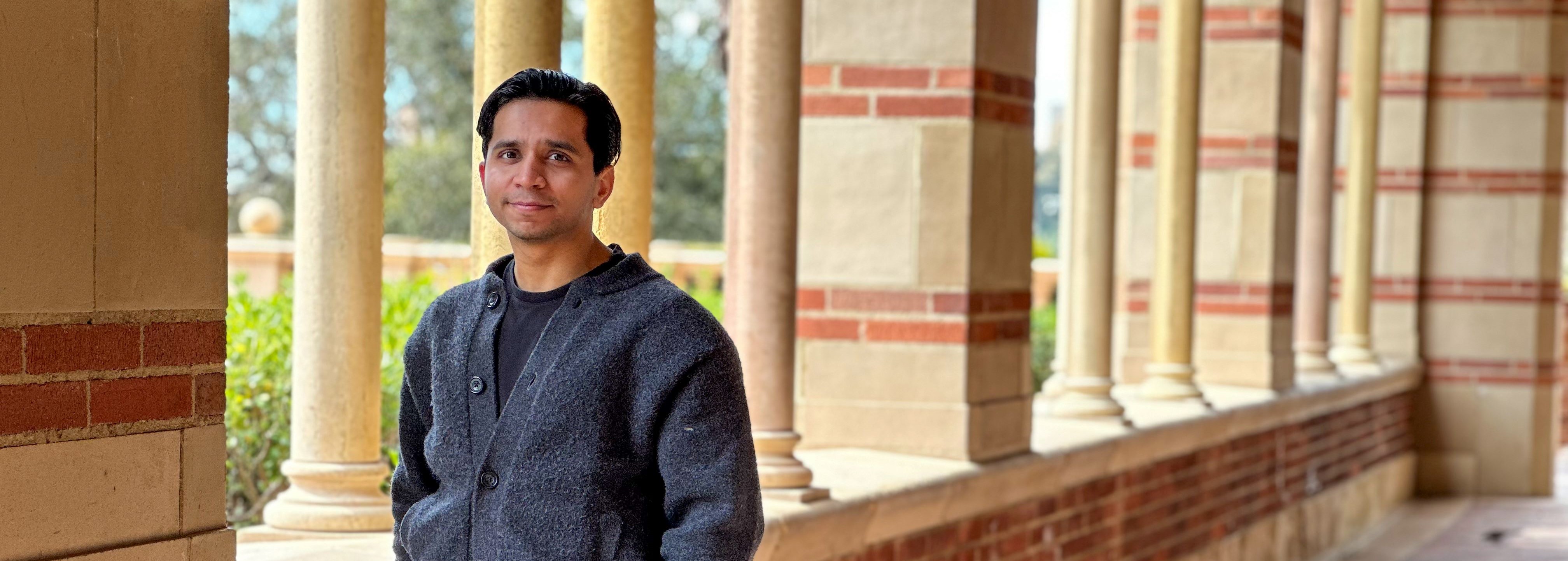
As a child, Akash Gupta read about the enigmas of space. Drawn into the endless mysteries of our universe, he set his sights skyward towards the stars and planets of our solar system and beyond.
Now a Ph.D. candidate studying planetary science at UCLA’s department of Earth, Planetary, and Space Sciences, Gupta is making impressive progress on his quest. He is one of only eight postdoctoral students in the nation to be named a 2023 51 Pegasi b Fellow, a prestigious and highly sought-after award that will allow him to reach even greater heights.
Through the fellowship, Gupta gains up to $415,000 of support for independent research from the Heising-Simons Foundation over the next three years; he plans to use these funds to study how Earth-like planets and their atmospheres form. The implications of his work are vast and far reaching; better understanding space and planetary climates could unlock paths for human life beyond Earth, as well as provide insight into the potential for pre-existing extraterrestrial life on distant exoplanets.
Exoplanets, which are any planets beyond our solar system, “...have transformed how we perceive our place in the universe,” said Gupta. “From being a topic of philosophical discourse, the search for a habitable Earth-like planet is now a tractable, albeit challenging, scientific goal. But to realize this goal, we need to first understand how such planets and their atmospheres form and evolve.”
Gupta’s current research is a massive step towards this goal. It investigates the various physical and chemical processes that shape Earth and Neptune-like exoplanets, and examines the curious exoplanetary size distribution gap between small, gaseous sub-Neptunes and rocky super-Earths in order to predict how the former may transform into the latter.
“The timescale of losing a primordial hydrogen atmosphere [like Neptune’s] and becoming an Earth-like rocky planet is on the order of a billion years,” said Gupta. “This process has a lot of implications for how habitable, Earth-like conditions could form.”
Gupta has already demonstrated that typical exoplanets are born with a puffy, hydrogen-rich atmosphere that can later be lost due to a combination of thermal energy stored during the exoplanet’s growth and energy from its parent star. It is this loss of atmosphere that leads to the formation of rocky, Earth-like exoplanets.
With his fellowship, Gupta will take his research to the next level.
He will examine how the loss of a hydrogen-rich atmosphere, in concurrence with other processes, transforms a planet’s atmospheric composition. He will also employ state-of-the-art computational techniques and tools – such as quantum mechanical simulations and machine learning – to investigate how planetary building blocks interact over a broad range of atmospheric conditions.
“How a planet’s primordial hydrogen atmosphere interacts with its interior plays a critical role in the nature of its final atmosphere,” Gupta explains. “But physical experiments with hydrogen at high temperatures and pressures are extremely hard. Quantum mechanics provides a tool to figure out what happens computationally. By adding machine learning, we gain the speed and precision to study complex systems at a more fundamental level.”
Gupta will receive a Ph.D. in planetary science from the University of California, Los Angeles in Spring 2023, before continuing on to Princeton University for his fellowship.
Congratulations, Akash!
See the announcement here: https://www.hsfoundation.org/news-stories/announcing-the-2023-class-of-51-pegasi-b-fellows/
About the 51 Pegasi b Fellowship
Established in 2017, the Heising-Simons Foundation’s 51 Pegasi b Fellowship is named for the first exoplanet discovered orbiting a Sun-like star. The growing field of planetary astronomy studies celestial objects both within and beyond our solar system, bridging planetary science and astronomy. From accelerating our understanding of planetary system formation and evolution in our solar system and beyond, to advancing new technologies for detecting Earth-like worlds, 51 Pegasi b Fellows make unique contributions to the field.
Learn more about the fellowship and the fellows at www.51pegasib.org.
About the Heising-Simons Foundation
The Heising-Simons Foundation is a family foundation based in Los Altos and San Francisco, California. The Foundation works with its many partners to advance sustainable solutions in climate and clean energy, enable groundbreaking research in science, enhance the education of our youngest learners, and support human rights for all people.
Learn more at www.hsfoundation.org.
